Apps
Auto Added by WPeMatico
Auto Added by WPeMatico
Google this morning unveiled a pair of new Android features for people who are deaf or hard of hearing. As the company notes in a blog post this morning, the WHO estimates that 900 million people will be living with hearing loss by 2055. The ubiquity of mobile devices — Android in particular — offers a promising potential to help open the lines of communication.
Live Transcribe is, perhaps, the more compelling of the two offerings. As its name implies, the feature transcribes audio in real time, so users with hearing loss can read text, in order to enable a live, two-way conversation. It defaults to white text on a black background, making it easier to read, and also can connect to external microphones for better results.
The feature leverages much of the company’s work in speech to text and translation. It starts rolling out today in limited beta for Pixel 3 users. It will be available in more than 70 languages and dialects.
Announced back at last year’s Google I/O, Sound Amplifier is designed to filter out ambient and unwanted noise, without boosting the volume on already loud sounds. The feature works with headphones, letting users manually adjust the settings for the right fit. That one is available now via the Play Store.
Powered by WPeMatico
A new mobile banking startup called Step wants to help bring teenagers and other young adults into the cashless era. Today, cash is used less often, as more consumers shop online and send money to one another through payment apps like Venmo. But teenagers in particular are still heavily burdened with cash — even though they, too, want to spend their money on things that require a payment card, like Amazon.com purchases or mobile gaming, for example.
That’s where Step comes in.
The company aims to address the needs of what it believes is an underserved market in mobile banking — the 75 million children and young adults under the age of 21 in the U.S., who are still being forced to use cash.
This market isn’t the “unbanked,” it’s the “pre-banked,” explains Step CEO CJ MacDonald, whose previous startup, mobile gift card platform Gyft, sold to First Data several years ago.
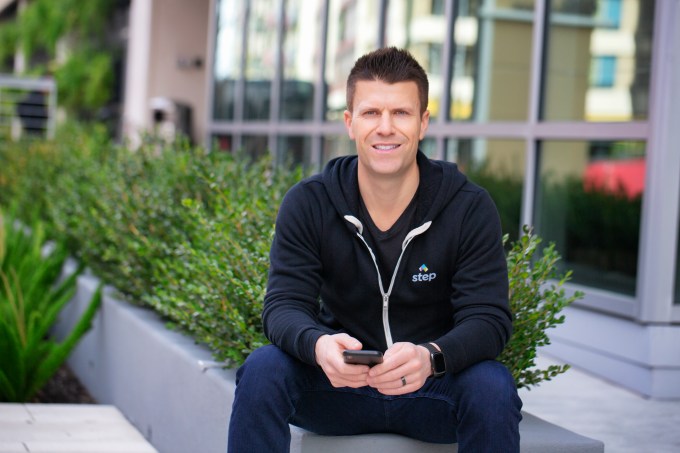
Above: Step CEO, CJ MacDonald
“We’re building an all-in-one banking solution that primarily focuses on teens and parents,” he says. “We want it to be a teen’s first bank account. We want to be a teen’s first spending card. And we want to teach financial literacy and responsibility firsthand.”
MacDonald, along with CTO Alexey Kalinichenko, previously of Square and financial services startup Token, founded Step in May 2018. The 10-person team also includes several prior Gyft employees.
Last summer, Step closed on $3.8 million in seed funding from Sesame Ventures, Crosslink Capital and Collaborative Fund. Crosslink general partner Eric Chin sits on the board.
While there are a number of mobile banking apps out there today — like Chime, Monzo, Simple, Revolut and others — Step will specifically target teens, 13 and up, and other young adults with its marketing. Teens under 18 still need parents’ approval to sign up, of course. But the goal is to encourage the teens to bring the idea to their parents — not the other way around.
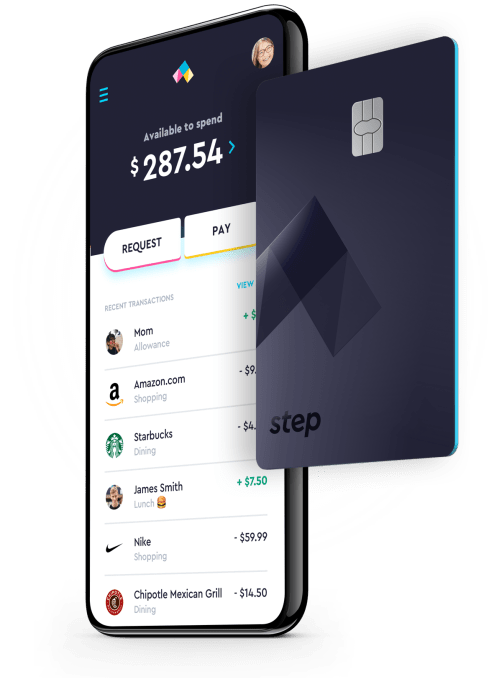 Step’s focus on this younger demographic puts it in a different space, where there are fewer competitors. Its more direct rivals are not the bigger mobile banks, but rather startups like teen debit card and bank app Current, or the parent-managed debit card for kids from Greenlight.
Step’s focus on this younger demographic puts it in a different space, where there are fewer competitors. Its more direct rivals are not the bigger mobile banks, but rather startups like teen debit card and bank app Current, or the parent-managed debit card for kids from Greenlight.
The mobile banking service Step provides will also aim to be more comprehensive than just a debit card. It will offer a combination of checking, savings and a Visa card that works as both credit and debit.
The card includes Visa’s Zero Liability Protection on all purchases from unauthorized use, and allows parents to set spending limits.
Parents will also be able to connect their own bank accounts to Step to instantly transfer in funds, which can then be distributed to kids’ accounts for things like allowances and chores, or other everyday spending needs. Step’s bank account itself is backed by Evolve Bank, so it’s FDIC-insured up to $250,000.
Unlike Current, which charges a subscription to use its service, Step aims to be a fee-free bank for consumers. Users don’t have to pay for their account, and there are no fees for things like overdrafts. Instead, Step’s plan is to generate revenue through traditional means — like interchange fees and by way of lending practices, once it has established a deposit base.
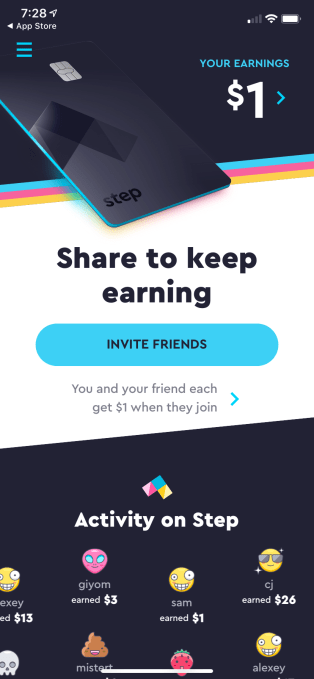 The company pays a 2.5 percent interest rate on deposits, offers a round-up savings feature and a range of budgeting tools and supports free instant transfers between Step accounts. It also provides access to a network of 35,000 ATMs with no fees.
The company pays a 2.5 percent interest rate on deposits, offers a round-up savings feature and a range of budgeting tools and supports free instant transfers between Step accounts. It also provides access to a network of 35,000 ATMs with no fees.
Beyond simply facilitating mobile banking, Step’s bigger goal is to teach teens to become financially responsible.
“Schools do not teach kids about money. A lot of families don’t talk about money. And it’s a crucial life skill that’s not really addressed properly when people are growing up,” says MacDonald, who says he was lacking in life skills in this area, even as a young college grad.
“There were ‘Money 101’ skills that I had not learned — that no one had talked to me about. Things like building credit, how many credit cards you should have, debt to income ratio,” he continues. “A lot of people get released into the real world without experience [in those areas],” he says.
Long-term, after solving the needs associated with everyday banking transactions, Step wants to layer on other products and services — like tools that allow a family to save together for college, for example.
The company is launching the banking service under an invite-only system to scale up.
Today, it’s opening a waitlist and referral program. When you invite a friend, you each receive one dollar. Access will then be rolled out on a first-come, first-serve basis this spring. Users can join Step through the website, iOS or Android application.
Powered by WPeMatico
It’s been a long year for Nintendo fans waiting on Mario Kart Tour to come to mobile and, unfortunately, more patience is required after the game’s launch was moved back to this summer.
Nintendo announced plans to bring the much-loved franchise to smartphones one year ago. It was originally slated to launch by the end of March 2019, but the Japanese games giant said today it is pushing that date back to summer 2019.
The key passage sits within Nintendo’s latest earnings report, released today, which explains that additional time is needed “to improve [the] quality of the application and expand the content offerings after launch.”
The checkered flag has been raised and the finish line is near. A new mobile application is now in development: Mario Kart Tour! #MarioKartTour Releasing in the fiscal year ending in March 2019. pic.twitter.com/8GIyR7ZM4z
— Nintendo of America (@NintendoAmerica) February 1, 2018
It’s frustrating but, as The Verge points out, you can refer to a famous Nintendo phrase if you are seeking comfort.
Shigeru Miyamoto, who created the Mario and Zelda franchises, once remarked that “a delayed game is eventually good, but a rushed game is forever bad.”
There’s plenty riding on the title — excuse the pun. Super Mario Run, the company’s first major game for the iPhone, showed its most popular IP has the potential to be a success on mobile, even though Mario required a $9.99 payment to go beyond the limited demo version. Mario Kart is the most successful Switch title to date, so it figures that it can be a huge smash on mobile if delivered in the right way.
Powered by WPeMatico
Facebook managed to beat Wall Street’s estimates in its Q4 earnings amidst a constant beat down in the press. Facebook hit 2.32 billion monthly users, up 2.2 perecent from 2.27 billion last quarter, speeding up its growth rate. Facebook climbed to 1.52 billion daily active users from 1.49 billion last quarter for a 2 percent growth rate that dwarfed last quarter’s 1.36 percent.
Facebook earned $16.91 billion off all those users with a $2.38 GAAP earnings per share. Those numbers handily beat Wall Street’s expectations of $16.39 billion in revenue and $2.18 GAAP earnings per share, plus 2.32 billion monthly and 1.51 billion daily active users. Facebook’s daily to monthly user ratio, or stickiness, held firm at 66 percent where it’s stayed for years, showing those still on Facebook aren’t using it much less.
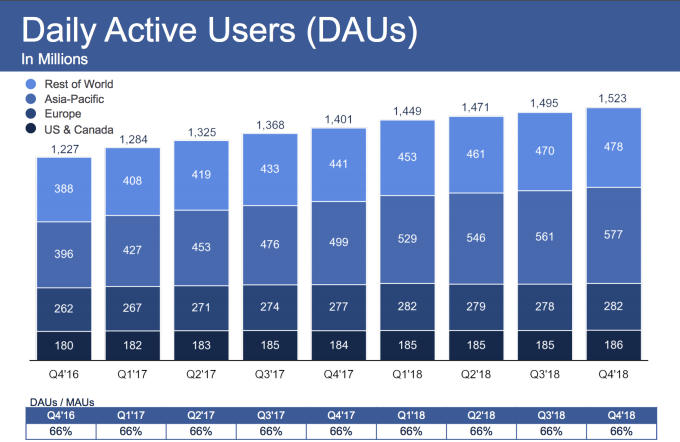
Facebook shares had closed today at $150.42 but shot up over 11 percent following the record revenue and profit announcements to hover around $167. A big 30 percent year-over-year boost in average revenue per user in North America fueled those gains. Yet that’s still down from $186 where it was a year ago and a peak of $217 in July.
CEO Mark Zuckerberg went beyond his usual intro to the earnings report where he assures investors things are going well and highlights new opportunities. This quarter he noted “We’ve fundamentally changed how we run our company to focus on the biggest social issues, and we’re investing more to build new and inspiring ways for people to connect.”
Facebook managed to grow its DAU in both the critical US & Canada and Europe markets where it earns the most money after stagnation or shrinkage in previous quarters. The fact that Facebook is no longer dwindling it its most lucrative markets is surely contributing to its share price climb. Facebook’s monthly active user plateaued in North America but roared up in Europe. That was shored up by a reversal of last quarter’s decline in Rest Of World average revenue per user, which fell 4.7% in Q3 but bounced back with 16.5 percent growth in Q4.
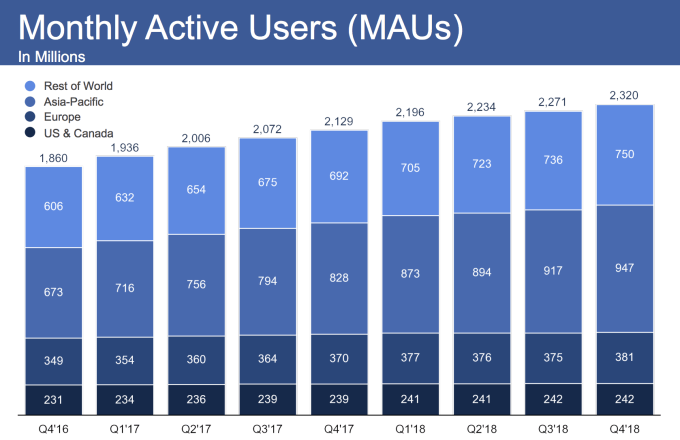
Facebook raked in $6.8 billion in profit this quarter as it slowed down hiring and only grew headcount 5 percent from 33,606 to 35,587. It seems Facebook has gotten to a comfortable place with its security staff-up in the wake of election interference, fake news, and content moderation troubles. Its revenue is up 30 percent year-over-year while profits grew 61 percent, which is pretty remarkable for a 15-year old technology company.
Facebook’s plan to concentrate on product innovation in 2019 after focusing on security in 2018 was the core of today’s earnings call. Zuckerberg laid out a product roadmap for more ephemerality and encryption, how unifying the infrastructure of Facebook’s messaging apps will better connect Marketplace to WhatsApp, Groups will become an organizing function for more of the Facebook experience, and shopping features will crop up across the family of apps. You can read Zuckerberg’s full opening statement here.
New stats included 500 million daily Instagram Stories users and 2 million advertisers on Stories. Zuckerberg said he was pleasantly surprised by Facebook Portal sales but didn’t give specifics. He revealed 2.7 billion people now use Facebook’s family of apps each month. However, CFO David Wehner warned the company would eventually stop sharing Facebook-only stats, presumably to mask the shift of younger users to its other apps. He also cautioned that due to the shift of users from feeds to Stories that Facebook has less experience monetizing, and targeting headwinds due to increased privacy scrutiny, Facebook predicts mid-single digit revenue growth rate reductions each quarter this year.
We just released our community update and quarterly results.We’ve fundamentally changed how we run our company to…
Posted by Mark Zuckerberg on Wednesday, January 30, 2019
While the quarter went well, morale isn’t quite as rosy. It’s been a brutal quarter for Facebook At least its swifter user growth rates show Facebook survived its biggest ever data breach without scaring off too many people. Meanwhile it’s continuously struggled with scandals like hiring opposition research firm Definers, and it saw its new teen app Lasso largely flop. Facebook will have to convince investors it knows how to win back the next generation, or at least keep squeezong a lot more money out of the last one like it did in Q4.
Powered by WPeMatico
In response to TechCrunch’s investigation of Facebook paying teens and adults to install a VPN that lets it analyze all their phone’s traffic, Senator Mark Warner (D-VA) has sent a letter to Mark Zuckerberg. It admonishes Facebook for not spelling out exactly which data the Facebook Research app was collecting or giving users adequate information necessary to determine if they should accept payment in exchange for selling their privacy. Following our report, Apple banned Facebook’s Research app from iOS and shut down its internal employee-only workplace apps too as punishment, causing mayhem in Facebook’s office.
Warner wrote to Zuckerberg, “In both the case of Onavo and the Facebook Research project, I have concerns that users were not appropriately informed about the extent of Facebook’s data-gathering and the commercial purposes of this data collection. Facebook’s apparent lack of full transparency with users – particularly in the context of ‘research’ efforts – has been a source of frustration for me.”
Warner is working on writing new laws to govern data collection initiatives like Facebook Research. He asks Zuckerberg, “Will you commit to supporting legislation requiring individualized, informed consent in all instances of behavioral and market research conducted by large platforms on users?”
Meanwhile, Senator Richard Blumenthal (D-CT) provided TechCrunch with a fiery statement regarding our investigation. He calls Facebook anti-competitive, which could fuel calls to regulate or break up Facebook, says the FTC must address the issue and that he’s planning to work with congress to safeguard teens’ privacy:
“Wiretapping teens is not research, and it should never be permissible. This is yet another astonishing example of Facebook’s complete disregard for data privacy and eagerness to engage in anti-competitive behavior. Instead of learning its lesson when it was caught spying on consumers using the supposedly ‘private’ Onavo VPN app, Facebook rebranded the intrusive app and circumvented Apple’s attempts to protect iPhone users. Facebook continues to demonstrate its eagerness to look over everyone’s shoulder and watch everything they do in order to make money.
Mark Zuckerberg’s empty promises are not enough. The FTC needs to step up to the plate, and the Onavo app should be part of its investigation. I will also be writing to Apple and Google on Facebook’s egregious behavior, and working in Congress to make sure that teens are protected from Big Tech’s privacy intrusions.”
And finally, Senator Edward J. Markey (D-MA) requests that Facebook stop recruiting teens for its Research program, and notes he’ll push his “Do Not Track Kids” act in Congress:
“It is inherently manipulative to offer teens money in exchange for their personal information when younger users don’t have a clear understanding how much data they’re handing over and how sensitive it is. I strongly urge Facebook to immediately cease its recruitment of teens for its Research Program and explicitly prohibit minors from participating. Congress also needs to pass legislation that updates children’s online privacy rules for the 21st century. I will be reintroducing my ‘Do Not Track Kids Act’ to update the Children’s Online Privacy Protection Act by instituting key privacy safeguards for teens.
But my concerns also extend to adult users. I am alarmed by reports that Facebook is not providing participants with complete information about the extent of the information that the company can access through this program. Consumers deserve simple and clear explanations of what data is being collected and how it being used.”
The senators’ statements do go a bit overboard. Though Facebook Research was aggressively competitive and potentially misleading, Blumenthal calling it “anti-competitive” is a stretch. And Warner’s questioning on whether “any user reasonably understood that they were giving Facebook root device access through the enterprise certificate” or that it uses the data to track competitors oversteps the bounds. Surely some savvy technologists did, but the question is whether all the teens and everyone else understood.
Facebook isn’t the only one paying users to analyze all their phone data. TechCrunch found that Google had a similar program called Screenwise Meter. Though it was more upfront about it, Google also appears to have violated Apple’s employee-only Enterprise Certificate rules. We may be seeing the start to an industry-wide crack down on market research surveillance apps that dangle gift cards in front of users to get them to give up a massive amount of privacy.
Warner’s full letter to Zuckerberg can be found below:
Dear Mr. Zuckerberg:
I write to express concerns about allegations of Facebook’s latest efforts to monitor user activity. On January 29th, TechCrunch revealed that under the auspices of partnerships with beta testing firms, Facebook had begun paying users aged 13 to 35 to install an enterprise certificate, allowing Facebook to intercept all internet traffic to and from user devices. According to subsequent reporting by TechCrunch, Facebook relied on intermediaries that often “did not disclose Facebook’s involvement until users had begun the signup process.” Moreover, the advertisements used to recruit participants and the “Project Disclosure” make no mention of Facebook or the commercial purposes to which this data was allegedly put.
This arrangement comes in the wake of revelations that Facebook had previously engaged in similar efforts through a virtual private network (VPN) app, Onavo, that it owned and operated. According to a series of articles by the Wall Street Journal, Facebook used Onavo to scout emerging competitors by monitoring user activity – acquiring competitors in order to neutralize them as competitive threats, and in cases when that did not work, monitor usage patterns to inform Facebook’s own efforts to copy the features and innovations driving adoption of competitors’ apps. In 2017, my staff contacted Facebook with questions about how Facebook was promoting Onavo through its Facebook app – in particular, framing the app as a VPN that would “protect” users while omitting any reference to the main purpose of the app: allowing Facebook to gather market data on competitors.
Revelations in 2017 and 2018 prompted Apple to remove Onavo from its App Store in 2018 after concluding that the app violated its terms of service prohibitions on monitoring activity of other apps on a user’s device, as well as a requirement to make clear what user data will be collected and how it will be used. In both the case of Onavo and the Facebook Research project, I have concerns that users were not appropriately informed about the extent of Facebook’s data-gathering and the commercial purposes of this data collection.
Facebook’s apparent lack of full transparency with users – particularly in the context of ‘research’ efforts – has been a source of frustration for me. As you recall, I wrote the Federal Trade Commission in 2014 in the wake of revelations that Facebook had undertaken a behavioral experiment on hundreds of thousands of users, without obtaining their informed consent. In submitted questions to your Chief Operating Officer, Sheryl Sandberg, I once again raised these concerns, asking if Facebook provided for “individualized, informed consent” in all research projects with human subjects – and whether users had the ability to opt out of such research. In response, we learned that Facebook does not rely on individualized, informed consent (noting that users consent under the terms of the general Data Policy) and that users have no opportunity to opt out of being enrolled in research studies of their activity. In large part for this reason, I am working on legislation to require individualized, informed consent in all instances of behavioral and market research conducted by large platforms on users.
Fair, robust competition serves as an impetus for innovation, product differentiation, and wider consumer choice. For these reasons, I request that you respond to the following questions:
1. Do you think any user reasonably understood that they were giving Facebook root device access through the enterprise certificate? What specific steps did you take to ensure that users were properly informed of this access?
2. Do you think any user reasonably understood that Facebook was using this data for commercial purposes, including to track competitors?
3. Will you release all participants from the confidentiality agreements Facebook made them sign?
4. As you know, I have begun working on legislation that would require large platforms such as Facebook to provide users, on a continual basis, with an estimate of the overall value of their data to the service provider. In this instance, Facebook seems to have developed valuations for at least some uses of the data that was collected (such as market research). This further emphasizes the need for users to understand fully what data is collected by Facebook, the full range of ways in which it is used, and how much it is worth to the company. Will you commit to supporting this legislation and exploring methods for valuing user data holistically?
5. Will you commit to supporting legislation requiring individualized, informed consent in all instances of behavioral and market research conducted by large platforms on users?
I look forward to receiving your responses within the next two weeks. If you should have any questions or concerns, please contact my office at 202-224-2023.
Powered by WPeMatico
In the wake of TechCrunch’s investigation yesterday, Apple blocked Facebook’s Research VPN app before the social network could voluntarily shut it down. The Research app asked users for root network access to all data passing through their phone in exchange for $20 per month. Apple tells TechCrunch that yesterday evening it revoked the Enterprise Certificate that allows Facebook to distribute the Research app without going through the App Store.
TechCrunch had reported that Facebook was breaking Apple’s policy that the Enterprise system is only for distributing internal corporate apps to employees, not paid external testers. That was actually before Facebook released a statement last night saying that it had shut down the iOS version of the Research program without mentioning that it was forced by Apple to do so.
TechCrunch’s investigation discovered that Facebook has been quietly operated the Research program on iOS and Android since 2016, recently under the name Project Atlas. It recruited 13 to 35 year olds, 5 percent of which were teenagers, with ads on Instagram and Snapchat and paid them a monthly fee plus referral bonuses to install Facebook’s Research app, the included VPN app that routes traffic to Facebook, and to ‘Trust’ the company with root network access to their phone. That lets Facebook pull in a user’s web browsing activity, what apps are on their phone and how they use them, and even decrypt their encrypted traffic. Facebook went so far as to ask users to screenshot and submit their Amazon order history. Facebook uses all this data to track competitors, assess trends, and plan its product roadmap.
Facebook was forced to remove its similar Onavo Protect app in August last year after Apple changed its policies to prohibit the VPN app’s data collection practices. But Facebook never shut down the Research app with the same functionality it was running in parallel. In fact, TechCrunch commissioned security expert Will Strafach to dig into the Facebook Research app, and we found that it featured tons of similar code and references to Onavo Protect. That means Facebook was purposefully disobeying the spirit of Apple’s 2018 privacy policy change while also abusing the Enterprise Certificate program.
Sources tell us that Apple revoking Facebook’s Enterprise Certificate has broken all of the company’s legitimate employee-only apps. Those include pre-launch internal-testing versions of Facebook and Instagram, as well as the employee apps for coordinating office collaboration, commutes, seeing the day’s lunch schedule, and more. That’s causing mayhem at Facebook, disrupting their daily work flow and ability to do product development. We predicted yesterday that Apple could take this drastic step to punish Facebook much harder than just removing its Research app. The disruption will translate into a huge loss of productivity for Facebook’s 33,000 employees.
[Update: Facebook later confirmed to TechCrunch that its internal apps were broken by Apple’s punishment and that it’s in talks with Apple to try to resolve the issue and get their employee tools running again.]
For reference, Facebook’s main iOS app still functions normally. Also, you can’t get paid for installing Onavo Protect on Android, only for the Facebook Research app. And Facebook isn’t the only one violating Apple’s Enterprise Certificate policy, as TechCrunch discovered Google’s Screenwise Meter surveillance app breaks the rules too.
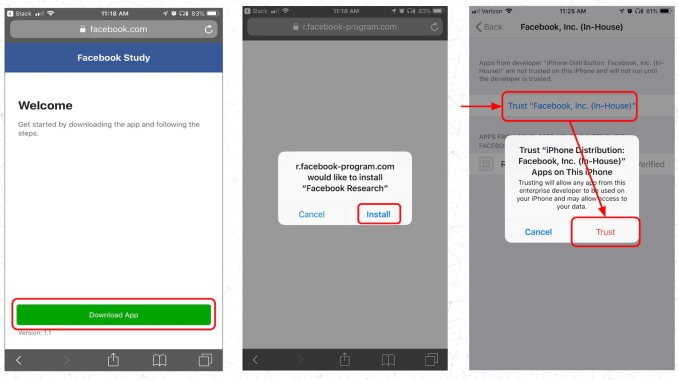
This morning, Apple informed us it had banned Facebook’s Research app yesterday before the social network seemingly pulled it voluntarily. Apple provided us with this strongly worded statement condemning the social network’s behavior:
“We designed our Enterprise Developer Program solely for the internal distribution of apps within an organization. Facebook has been using their membership to distribute a data-collecting app to consumers, which is a clear breach of their agreement with Apple. Any developer using their enterprise certificates to distribute apps to consumers will have their certificates revoked, which is what we did in this case to protect our users and their data.”
That comes in direct contradiction to Facebook’s initial response to our investigation. Facebook claimed it was in alignment with Apple’s Enterprise Certificate policy and that the program was no different than a focus group.
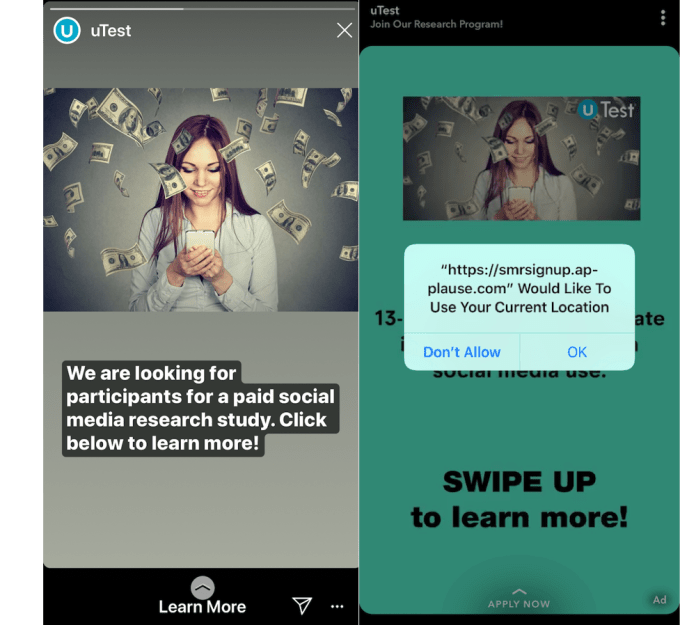
Seven hours later, a Facebook spokesperson said it was pulling its Research program from iOS without mentioning that Apple forced it to do so, and issued this statement disputing the characterization of our story:
“Key facts about this market research program are being ignored. Despite early reports, there was nothing ‘secret’ about this; it was literally called the Facebook Research App. It wasn’t ‘spying’ as all of the people who signed up to participate went through a clear on-boarding process asking for their permission and were paid to participate. Finally, less than 5 percent of the people who chose to participate in this market research program were teens. All of them with signed parental consent forms.”
We refute those accusations by Facebook. As we wrote yesterday night, Facebook did not publicly promote the Research VPN itself and used intermediaries that often didn’t disclose Facebook’s involvement until users had begun the signup process. While users were given clear instructions and warnings, the program never stresses nor mentions the full extent of the data Facebook can collect through the VPN. A small fraction of the users paid may have been teens, but we stand by the newsworthiness of its choice not to exclude minors from this data collection initiative.
Senator Mark Warner has since called on Facebook CEO Mark Zuckerberg to support legislation requiring individual informed consent for market research initiatives like Facebook Research. Meanwhile, Senator Richard Blumenthal issued a fierce statement that “Wiretapping teens is not research, and it should never be permissible.”
The situation will surely worsen the relationship between Facebook and Apple after years of mounting animosity between the tech giants. Apple’s Tim Cook has repeatedly criticized Facebook’s data collection practices, and Zuckerberg has countered that it offers products for free for everyone rather than making products few can afford like Apple. Flared tensions could see Facebook receive less promotion in the App Store, fewer integrations into iOS, and more jabs from Cook. Meanwhile, the world sees Facebook as having been caught red-handed threatening user privacy and breaking Apple policy.
Powered by WPeMatico
Well, that was short-lived: Just 36 hours after Curve, the London fintech that lets you consolidate all of your bank cards into a single Curve card, re-instated support for Amex, the feature has once again been unceremoniously blocked by American Express. This time, however, the context feels very different from 2016, when the startup was barely off the ground, with Curve telling customers in an email this morning that it intends to “fight Amex’s decision with our full might.”
Going up against the deep pockets and dominant market position of American Express will undoubtedly be a “David and Goliath” battle, although, unlike two years ago, Curve is now backed by an array of investors that includes Connect Ventures and Santander. Arguably, the startup will have U.K. and EU payments and competition regulations on its side, too, although it is hard to predict with certainty if the U.K. regulators will use their full teeth in a situation like this and how they will interpret those existing U.K. and EU regulations.
Curve’s position, however, is clear: In the same email to customers, the company has called the move “anti-competitive” and says it is “entirely disproportionate and discriminatory” to Curve. “U.K. payment regulations clearly state that Curve should be allowed to access the Amex payment network on a level-playing field with every other fee-paying and legitimate merchant,” writes the startup.
However, American Express disputes this, telling TechCrunch it doesn’t have regulatory obligations to work “with Curve or any individual merchants.”
Meanwhile, the credit card giant has been busy briefing journalists that it ended its merchant contract with Curve for business reasons, following what looked like a successful beta test with a small number of joint customers. Perhaps the trial was too successful, with American Express telling me Curve customers were using Amex added to Curve in ways that were different to its regular customers, which, one could argue, is the whole point. To truly innovate, you have to offer something new. Something truly new, has to be different.
With that said, the method with which Curve was accessing the Amex network is a well-established one. Technically, Curve had signed a “merchant” contract with American Express, just like any other merchant and many existing e-wallet products, such as PayPal or YoYo Wallet, which, notably, haven’t been blocked. As part of the trial period, the fintech also made changes to its own product to accommodate Amex, requiring customers to top up their Curve card in advance if they wanted to spend from their Curve-Amex wallet.
In other words, this was definitely not a “don’t ask for permission, ask for forgiveness” situation on Curve’s part. The two companies had been working together for months, and in talks for even longer, to get Curve back on the Amex network. A merchant contract had been signed. What changed at the 11th hour is unclear, although we can be sure this one has a long way to play out just yet.
American Express provided TechCrunch with the following statement:
We participated in a limited Curve beta test in which we explored enabling Card Members to load funds onto an e-wallet using their Amex Card in the Curve app. A very small number of Amex Card Members participated in the test. Based on the results, we communicated to Curve that we would not participate in the further roll out of Curve because of concerns related to the overall American Express Card Member experience. Subsequently we terminated our contract with them.
And here’s the full email sent out by Curve to customers, myself included:
Dear Steve,
We are extremely sorry that the top-up functionality of your Amex wallet is currently disabled.
Like thousands of other UK merchants, Curve has a valid merchant agreement to accept Amex payments into its e-wallet. However, on Tuesday evening, Amex decided to terminate this agreement and block all Amex transactions to Curve with immediate effect.
Amex has given no good or fair reason for their decision and we believe it is entirely disproportionate and discriminatory to Curve and all our (joint) customers. UK payment regulations clearly state that Curve should be allowed to access the Amex payment network on a level-playing field with every other fee-paying and legitimate merchant.
Rest assured that you can still spend the funds that you have already topped up to your existing Amex Wallets. If you have contacted us for support, we apologise for the delay in response and will endeavour to do so as soon as possible. We will update you as soon as we have any further information.
With your interests in mind, and our mission to deliver a truly innovative product, we intend to fight Amex’s decision with our full might. We believe financial freedom is the future and we are prepared to fight for yours.
Team Curve
Powered by WPeMatico
Wannaby, a startup out of Belarus that is building “AR commerce” experiences, has launched a beta of its latest app, which aims to make it easier to find the perfect sneakers.
Dubbed “Wanna Kicks,” the iOS app uses augmented reality to let you “try on” various pairs of sneakers. You simply choose a pair of kicks from the list of 3D models, point your camera at your feet and — bingo — you’re now virtually wearing your chosen footwear.
The effect is pretty instant and tracks reasonably well as you move and rotate your feet or change camera angle. You can even try walking and the AR app will follow your footsteps. It doesn’t work quite as well standing in front of a mirror, which would be more useful, but that is something Wanna Kicks’ makers say they are working on.
Ultimately, however, Wannaby believes its technology can help both customers and retailers. The premise is simple: The better idea you have of how a pair of sneakers will look when you’re actually wearing them, the more likely you are to make the right purchase and the less likely you are to return an item. Online retailers spend a lot of their margins trying to get customers to convert, and arguably even more servicing returns.
“Our mission is to break online shopping barriers,” Wannaby CEO and ex-Googler Sergey Arkhangelskiy tells me. “We believe that AR try-on can help customers to shop online and will wash away the difference between online and offline shopping. We see two major problems in the shoe market. Online conversions are quite low, and returns are quite high, in comparison to traditional ‘brick-and-mortar’ shopping. The ability to try sneakers with your phone before buying online should shift conversions, engagement and returns.”
Arkhangelskiy argues that AR is also a great marketing tool. Unsurprisingly, Wanna Kicks lets you save a photo of your feed clad in new virtual sneakers, which you can then share on social media. Video sharing is in the pipeline, too.
“Many shoe brands are presenting their new releases both online and offline,” he says. “Lots of customers are eager to know more about new sneaker releases, and AR is a great new way for people to experience sneakers that are new to the market or are about to get to the market. Essentially, this is the main idea behind Wanna Kicks: allowing users to choose and decide whether they like a shoe or not without visiting a physical store.”
Under the hood, Wannaby says it uses sophisticated “3D geometry algorithms” together with neural networks to identify the position of the shoe in space. It’s these algorithms that the startup says are its secret sauce and the company’s main innovation. To onboard sneakers into the app, Wannaby utilises its own studio to create bespoke 3D models.
“We’ve built Wanna Kicks for Gen Z and millennials who are interested in buying sneakers and eager to know whether they will fit their style or not,” adds Arkhangelskiy. “The AR and AI community will love our launch as well — we’ve accomplished a really difficult task in computer vision and rendering.”
Meanwhile, Wannaby is backed by Bulba Ventures and Haxus. The startup has raised $2 million in seed funding to date.
Powered by WPeMatico
Desperate for data on its competitors, Facebook has been secretly paying people to install a “Facebook Research” VPN that lets the company suck in all of a user’s phone and web activity, similar to Facebook’s Onavo Protect app that Apple banned in June and that was removed in August. Facebook sidesteps the App Store and rewards teenagers and adults to download the Research app and give it root access in what may be a violation of Apple policy so the social network can decrypt and analyze their phone activity, a TechCrunch investigation confirms. Facebook admitted to TechCrunch it was running the Research program to gather data on usage habits, and it has no plans to stop.
Since 2016, Facebook has been paying users ages 13 to 35 up to $20 per month plus referral fees to sell their privacy by installing the iOS or Android “Facebook Research” app. Facebook even asked users to screenshot their Amazon order history page. The program is administered through beta testing services Applause, BetaBound and uTest to cloak Facebook’s involvement, and is referred to in some documentation as “Project Atlas” — a fitting name for Facebook’s effort to map new trends and rivals around the globe.
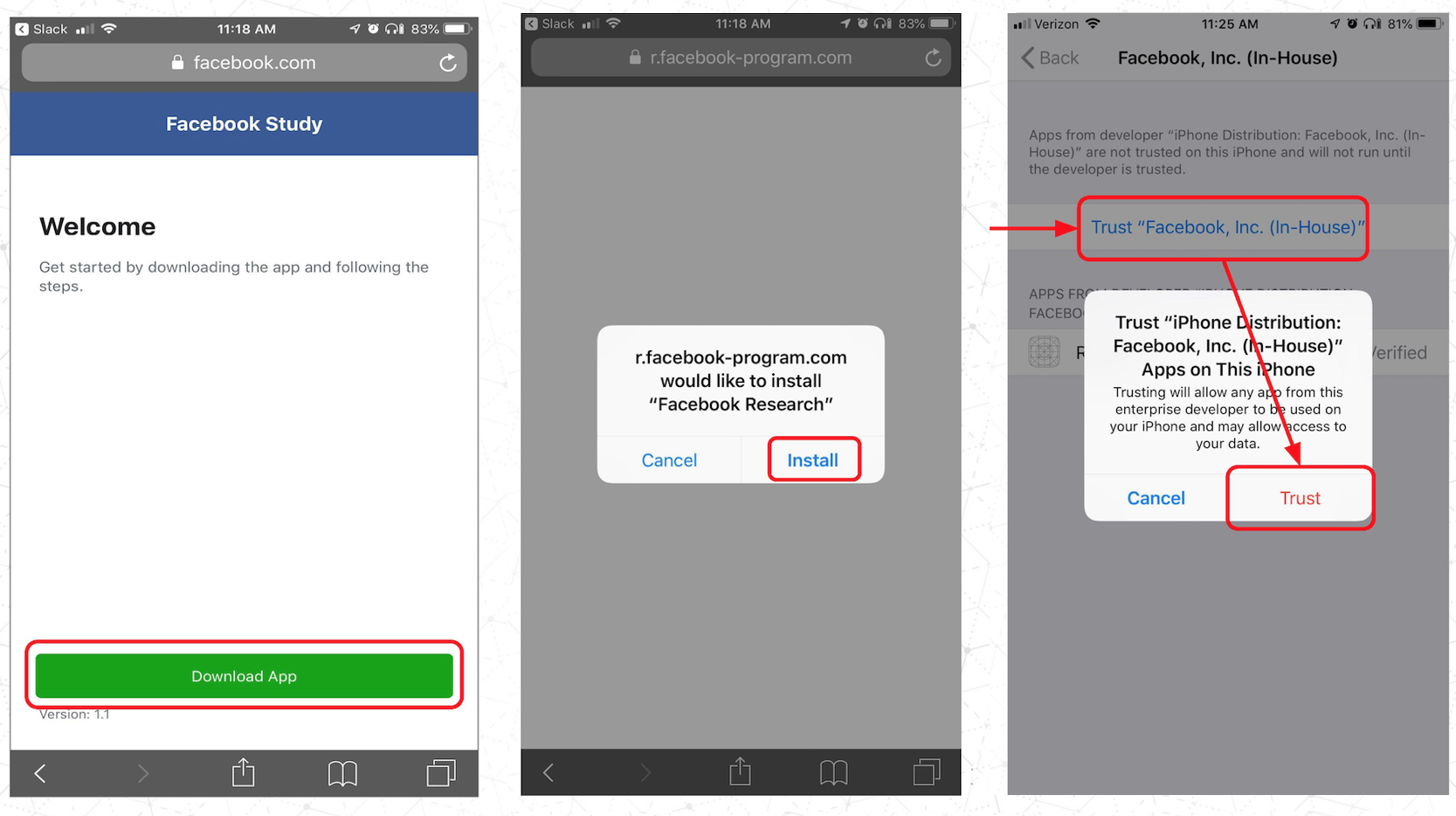
We asked Guardian Mobile Firewall’s security expert Will Strafach to dig into the Facebook Research app, and he told us that “If Facebook makes full use of the level of access they are given by asking users to install the Certificate, they will have the ability to continuously collect the following types of data: private messages in social media apps, chats from in instant messaging apps – including photos/videos sent to others, emails, web searches, web browsing activity, and even ongoing location information by tapping into the feeds of any location tracking apps you may have installed.” It’s unclear exactly what data Facebook is concerned with, but it gets nearly limitless access to a user’s device once they install the app.
The strategy shows how far Facebook is willing to go and how much it’s willing to pay to protect its dominance — even at the risk of breaking the rules of Apple’s iOS platform on which it depends. Apple could seek to block Facebook from continuing to distribute its Research app, or even revoke it permission to offer employee-only apps, and the situation could further chill relations between the tech giants. Apple’s Tim Cook has repeatedly criticized Facebook’s data collection practices. Facebook disobeying iOS policies to slurp up more information could become a new talking point. TechCrunch has spoken to Apple and it’s aware of the issue, but the company did not provide a statement before press time.

“The fairly technical sounding ‘install our Root Certificate’ step is appalling,” Strafach tells us. “This hands Facebook continuous access to the most sensitive data about you, and most users are going to be unable to reasonably consent to this regardless of any agreement they sign, because there is no good way to articulate just how much power is handed to Facebook when you do this.”
Facebook first got into the data-sniffing business when it acquired Onavo for around $120 million in 2014. The VPN app helped users track and minimize their mobile data plan usage, but also gave Facebook deep analytics about what other apps they were using. Internal documents acquired by Charlie Warzel and Ryan Mac of BuzzFeed News reveal that Facebook was able to leverage Onavo to learn that WhatsApp was sending more than twice as many messages per day as Facebook Messenger. Onavo allowed Facebook to spot WhatsApp’s meteoric rise and justify paying $19 billion to buy the chat startup in 2014. WhatsApp has since tripled its user base, demonstrating the power of Onavo’s foresight.
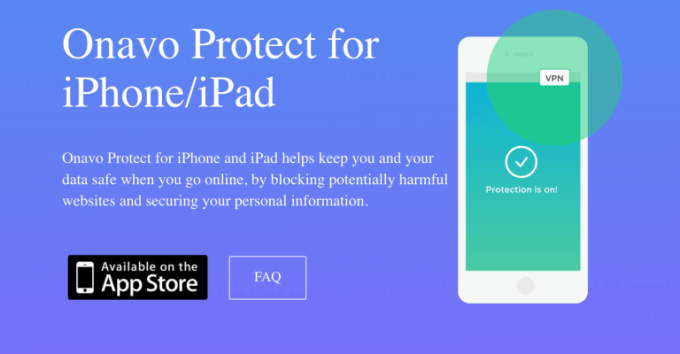
Over the years since, Onavo clued Facebook in to what apps to copy, features to build and flops to avoid. By 2018, Facebook was promoting the Onavo app in a Protect bookmark of the main Facebook app in hopes of scoring more users to snoop on. Facebook also launched the Onavo Bolt app that let you lock apps behind a passcode or fingerprint while it surveils you, but Facebook shut down the app the day it was discovered following privacy criticism. Onavo’s main app remains available on Google Play and has been installed more than 10 million times.
The backlash heated up after security expert Strafach detailed in March how Onavo Protect was reporting to Facebook when a user’s screen was on or off, and its Wi-Fi and cellular data usage in bytes even when the VPN was turned off. In June, Apple updated its developer policies to ban collecting data about usage of other apps or data that’s not necessary for an app to function. Apple proceeded to inform Facebook in August that Onavo Protect violated those data collection policies and that the social network needed to remove it from the App Store, which it did, Deepa Seetharaman of the WSJ reported.
But that didn’t stop Facebook’s data collection.
TechCrunch recently received a tip that despite Onavo Protect being banished by Apple, Facebook was paying users to sideload a similar VPN app under the Facebook Research moniker from outside of the App Store. We investigated, and learned Facebook was working with three app beta testing services to distribute the Facebook Research app: BetaBound, uTest and Applause. Facebook began distributing the Research VPN app in 2016. It has been referred to as Project Atlas since at least mid-2018, around when backlash to Onavo Protect magnified and Apple instituted its new rules that prohibited Onavo. Facebook didn’t want to stop collecting data on people’s phone usage and so the Research program continued, in disregard for Apple banning Onavo Protect.
![]() Ads (shown below) for the program run by uTest on Instagram and Snapchat sought teens 13-17 years old for a “paid social media research study.” The sign-up page for the Facebook Research program administered by Applause doesn’t mention Facebook, but seeks users “Age: 13-35 (parental consent required for ages 13-17).” If minors try to sign-up, they’re asked to get their parents’ permission with a form that reveal’s Facebook’s involvement and says “There are no known risks associated with the project, however you acknowledge that the inherent nature of the project involves the tracking of personal information via your child’s use of apps. You will be compensated by Applause for your child’s participation.” For kids short on cash, the payments could coerce them to sell their privacy to Facebook.
Ads (shown below) for the program run by uTest on Instagram and Snapchat sought teens 13-17 years old for a “paid social media research study.” The sign-up page for the Facebook Research program administered by Applause doesn’t mention Facebook, but seeks users “Age: 13-35 (parental consent required for ages 13-17).” If minors try to sign-up, they’re asked to get their parents’ permission with a form that reveal’s Facebook’s involvement and says “There are no known risks associated with the project, however you acknowledge that the inherent nature of the project involves the tracking of personal information via your child’s use of apps. You will be compensated by Applause for your child’s participation.” For kids short on cash, the payments could coerce them to sell their privacy to Facebook.
The Applause site explains what data could be collected by the Facebook Research app (emphasis mine):
“By installing the software, you’re giving our client permission to collect data from your phone that will help them understand how you browse the internet, and how you use the features in the apps you’ve installed . . . This means you’re letting our client collect information such as which apps are on your phone, how and when you use them, data about your activities and content within those apps, as well as how other people interact with you or your content within those apps. You are also letting our client collect information about your internet browsing activity (including the websites you visit and data that is exchanged between your device and those websites) and your use of other online services. There are some instances when our client will collect this information even where the app uses encryption, or from within secure browser sessions.”
Meanwhile, the BetaBound sign-up page with a URL ending in “Atlas” explains that “For $20 per month (via e-gift cards), you will install an app on your phone and let it run in the background.” It also offers $20 per friend you refer. That site also doesn’t initially mention Facebook, but the instruction manual for installing Facebook Research reveals the company’s involvement.

Facebook seems to have purposefully avoided TestFlight, Apple’s official beta testing system, which requires apps to be reviewed by Apple and is limited to 10,000 participants. Instead, the instruction manual reveals that users download the app from r.facebook-program.com and are told to install an Enterprise Developer Certificate and VPN and “Trust” Facebook with root access to their phone plus much of the data it transmits. Apple requires that developers agree to only use this certificate system for distributing internal corporate apps to their own employees. Randomly recruiting testers and paying them a monthly fee appears to violate the spirit of that rule.
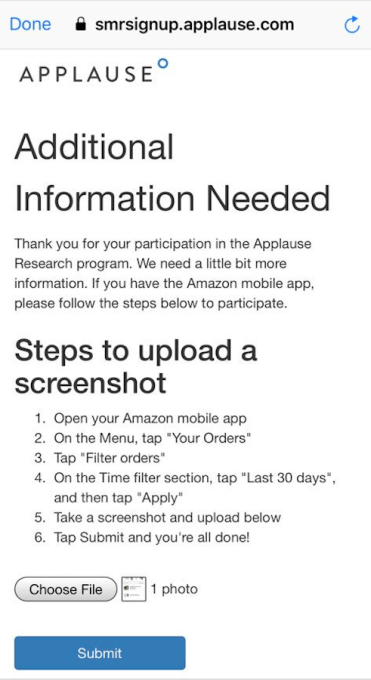 Once installed, users just had to keep the VPN running and sending data to Facebook to get paid. The Applause-administered program requested that users screenshot their Amazon orders page. This data could potentially help Facebook tie browsing habits and usage of other apps with purchase preferences and behavior. That information could be harnessed to pinpoint ad targeting and understand which types of users buy what.
Once installed, users just had to keep the VPN running and sending data to Facebook to get paid. The Applause-administered program requested that users screenshot their Amazon orders page. This data could potentially help Facebook tie browsing habits and usage of other apps with purchase preferences and behavior. That information could be harnessed to pinpoint ad targeting and understand which types of users buy what.
TechCrunch commissioned Strafach to analyze the Facebook Research app and find out where it was sending data. He confirmed that data is routed to “vpn-sjc1.v.facebook-program.
“It is tricky to know what data Facebook is actually saving (without access to their servers). The only information that is knowable here is what access Facebook is capable of based on the code in the app. And it paints a very worrisome picture,” Strafach explains. “They might respond and claim to only actually retain/save very specific limited data, and that could be true, it really boils down to how much you trust Facebook’s word on it. The most charitable narrative of this situation would be that Facebook did not think too hard about the level of access they were granting to themselves . . . which is a startling level of carelessness in itself if that is the case.”
In response to TechCrunch’s inquiry, a Facebook spokesperson confirmed it’s running the program to learn how people use their phones and other services. The spokesperson told us “Like many companies, we invite people to participate in research that helps us identify things we can be doing better. Since this research is aimed at helping Facebook understand how people use their mobile devices, we’ve provided extensive information about the type of data we collect and how they can participate. We don’t share this information with others and people can stop participating at any time.”
Facebook’s spokesperson claimed that the Facebook Research app was in line with Apple’s Enterprise Certificate program, but didn’t explain how in the face of evidence to the contrary. They said Facebook first launched its Research app program in 2016. They tried to liken the program to a focus group and said Nielsen and comScore run similar programs, yet neither of those ask people to install a VPN or provide root access. The spokesperson confirmed the Facebook Research program does recruit teens but also other age groups from around the world. They claimed that Onavo and Facebook Research are separate programs, but admitted the same team supports both as an explanation for why their code was so similar.

However, Facebook claim that it doesn’t violate Apple’s Enterprise Certificate policy is directly contradicted by the terms of that policy. Those include that developers “Distribute Provisioning Profiles only to Your Employees and only in conjunction with Your Internal Use Applications for the purpose of developing and testing”. The policy also states that “You may not use, distribute or otherwise make Your Internal Use Applications available to Your Customers” unless under direct supervision of employees or on company premises. Given Facebook’s customers are using the Enterprise Certificate-powered app without supervision, it appears Facebook is in violation.
Facebook disobeying Apple so directly could hurt their relationship. “The code in this iOS app strongly indicates that it is simply a poorly re-branded build of the banned Onavo app, now using an Enterprise Certificate owned by Facebook in direct violation of Apple’s rules, allowing Facebook to distribute this app without Apple review to as many users as they want,” Strafach tells us. ONV prefixes and mentions of graph.onavo.com, “onavoApp://” and “onavoProtect://” custom URL schemes litter the app. “This is an egregious violation on many fronts, and I hope that Apple will act expeditiously in revoking the signing certificate to render the app inoperable.”
Facebook is particularly interested in what teens do on their phones as the demographic has increasingly abandoned the social network in favor of Snapchat, YouTube and Facebook’s acquisition Instagram. Insights into how popular with teens is Chinese video music app TikTok and meme sharing led Facebook to launch a clone called Lasso and begin developing a meme-browsing feature called LOL, TechCrunch first reported. But Facebook’s desire for data about teens riles critics at a time when the company has been battered in the press. Analysts on tomorrow’s Facebook earnings call should inquire about what other ways the company has to collect competitive intelligence.
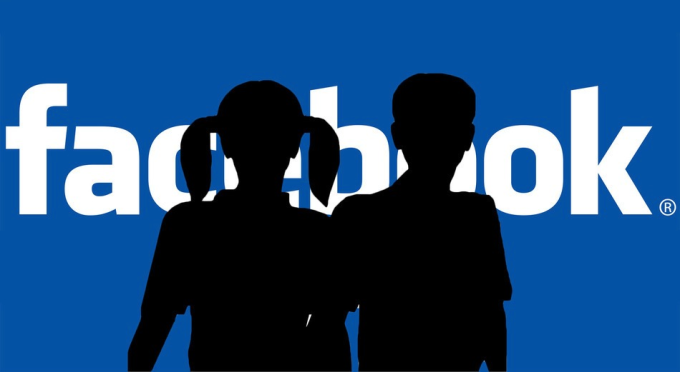
Last year when Tim Cook was asked what he’d do in Mark Zuckerberg’s position in the wake of the Cambridge Analytica scandal, he said “I wouldn’t be in this situation . . . The truth is we could make a ton of money if we monetized our customer, if our customer was our product. We’ve elected not to do that.” Zuckerberg told Ezra Klein that he felt Cook’s comment was “extremely glib.”
Now it’s clear that even after Apple’s warnings and the removal of Onavo Protect, Facebook is still aggressively collecting data on its competitors via Apple’s iOS platform. “I have never seen such open and flagrant defiance of Apple’s rules by an App Store developer,” Strafach concluded. If Apple shuts the Research program down, Facebook will either have to invent new ways to surveil our behavior amidst a climate of privacy scrutiny, or be left in the dark.
Additional reporting by Zack Whittaker.
Powered by WPeMatico
If you haven’t been paying attention to TikTok, you haven’t been paying attention. The short-form video app hailing from Beijing’s ByteDance just had its biggest month ever with the addition of 75 million new users in December — a 275 percent increase from the 20 million it added in December 2017, according a recent report from Sensor Tower.
Despite its rapid rise, there are still plenty of people — often, older people — who aren’t quite sure what TikTok is.
TikTok is often referred to as a “lip-syncing” app, which makes it sound like it’s some online karaoke experience. But a closer comparison would be Vine, Twitter’s still sorely missed short-form video app whose content lives on as YouTube compilations.
While it’s true that TikTok is home to some standard lip-syncing, it’s actually better known for its act-out memes backed by music and other sound clips, which get endlessly reproduced and remixed among its young users.
Its tunes are varied — pop, rap, R&B, electro and DJ tracks serve as backing for its 15-second video clips. But the sounds may also be snagged from YouTube music videos (see: I Baked You A Pie above), SoundCloud or from pop culture — like weird soundbites from Peppa Pig or Riverdale — or just original creations.
These memes-as-videos reference things familiar to Gen Z, like gaming culture (see below). They come in the form of standalone videos, reactions, duets, mirrors/clones and more.
The app has been growing steadily since it acquired its U.S.-based rival Musical.ly in November 2017 for north of $800 million, then merged the two apps’ user bases last August.
This gave TikTok the means to grow in Western markets, where it has attracted the interest of U.S. celebrities like Jimmy Fallon and Tony Hawk, for example, along with YouTubers on the hunt for the next new thing.
But unlike Vine (RIP), YouTube or Instagram, TikTok doesn’t yet feel dominated by micro-celebs, though they certainly exist.
Instead, its main feed often surfaces everyday users — aka, amateurs — doing something cute, funny or clever, with a tacit acknowledgement that “yes, this is an internet joke” underlying much of the content.
Okay, okay.
Sometimes these videos are described as “cringey.”
But that’s because those of us trying to talk about TikTok are old(er) people who grew up on the big ol’ mean internet.
Cringey, frankly, is an unfair label, as it dismisses TikTok’s success in setting a tone for its community. Here, users will often post and share unapologetically wholesome content, and receive less mocking than elsewhere on the web — largely because everyone else on TikTok posts similar “cringey” content, too.
You might not know this, however, if your only exposure to TikTok comes from YouTube’s TikTok Cringe Compilations. But spend a day in the (oddly addictive) TikTok feed, and you’ll find a whole world of video that doesn’t exist anywhere else on the web — including on YouTube. Videos that are weird, sure — but also fun to watch.
It’s a stark comparison to the existing social media platforms.
Users today are engaged in the culture wars on Twitter (ban the Nazis! protect free speech!), while YouTubers are gaming the algorithm with hateful, exploitive, dangerous and otherwise questionable content that freaks out advertisers. And Facebook is, well, contributing to war crimes and the toppling of democracy.
Meanwhile, TikTok presents an alternative version of online sharing. Simple, goofy, irreverent — and frankly, it’s a much needed reset.
For example, some of the popular TikTok memes have included videos of kids proclaiming what a great mom they have, as they drag her into frame, or they remind people to pick up litter and conserve water. They might give themselves silly, but self-affirming makeovers where, afterwards, they cite themselves not as “cute” but rather “drop. dead. gorgeous.”
They might spend hours setting up gummy bears as Adele concert-goers, learning how to do a shuffle dance up a set of stairs or in a dance battle their dad. Or they may showcase some special talent — drawing, painting, gymnastics, dance or skateboarding, perhaps. They do science experiments, make jokes or use special effects for a little video magic.
They shout out “hit or miss!” in public places and wait to see who answers. (Look it up.)
Sometimes it’s dumb, Sometimes it’s clever. But it’s addictive.
Of course, it is still the internet. And TikTok isn’t perfect.
The app has also been the subject of troubling reports about its “dark” side, which is reportedly filled with child predators and teens bullying and harassing one another. It’s not clear, however, that TikTok’s affliction with these matters is any worse than any other large, social, public-by-default app of its size.
And unlike some apps, concerned parents — or the users themselves — can set a TikTok account to private, turn off commenting, hide the account from search, disable downloads, disallow reactions and duets and restrict an account from receiving messages.
It is concerning, however, that under-13 kids are setting up social media accounts without parental consent. (But, uh, have you seen Fortnite and Roblox? This is what kids do. At least the TikTok main feed isn’t worrisome, we’ve found.)
The bigger issue, though — and one that could ultimately prove damaging to TikTok — is whether it will be able to keep up with content filtering and takedown requests, or handle its security and privacy protection issues as it scales up.
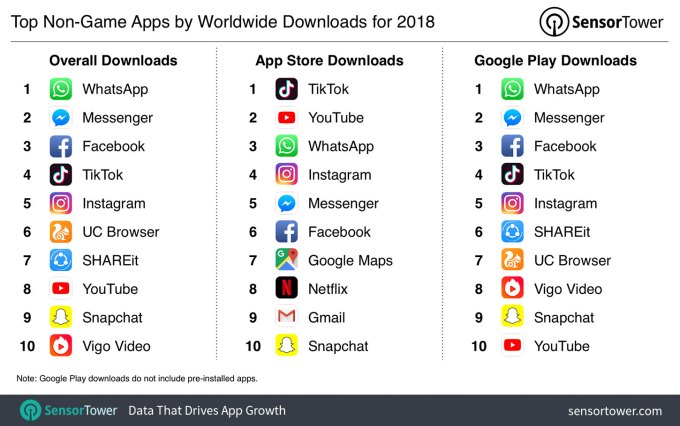
Content and community aren’t the only things contributing to TikTok’s growth.
While Vine may have introduced the concept of short-form video, TikTok made video editing incredibly simple. You don’t need to be a video expert to put together clips with a range of effects. It’s the Instagram for the mobile video age — in a way that Instagram itself won’t be able to reproduce, having already aligned its community with influencers and advertisers.
TikTok’s sizable user base, meanwhile, is due not only to its growth in Western markets, but because of its traction in emerging markets like China and India.
This allowed TikTok to rank No. 4 worldwide across iOS and Android, combined, according to App Annie’s data on the most-downloaded apps of 2018. On iOS, TikTok was the No. 1 most-downloaded app of the year, mainly thanks to China.
At times last year, TikTok even ranked higher than Facebook, Instagram, Snapchat and YouTube.
Both App Annie and Sensor Tower agree that TikTok scored the No. 3 position for most installs among all apps worldwide in 2018.
Now, TikTok is growing in India, says Sensor Tower.
The country accounted for 27 percent of new installs between December 2017 and December 2018, and last month was the source for 32.3 million of TikTok’s 75 million total new downloads — a 25x increase from last year.
Some of this growth comes from ad spend, according to a report from Apptopia, which examined the app’s widened use of ad networks. (It’s also driving people bonkers with its YouTube ads).
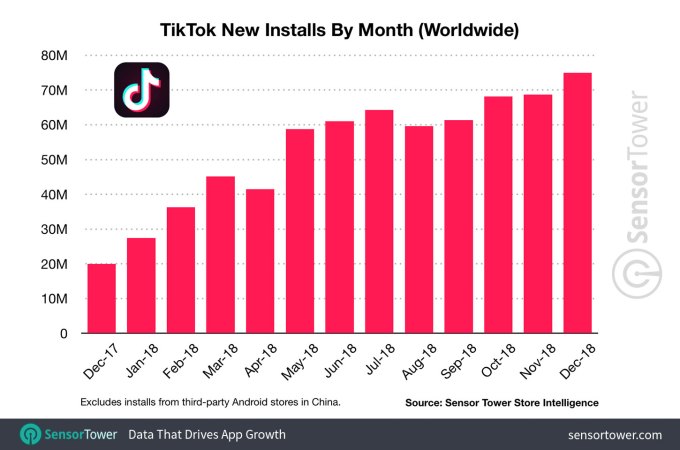
The revenue is starting to arrive, as well.
Worldwide, users spent $6 million tipping their favorite live streamers, a 253 percent year-over-year jump from December 2017’s total of $1.7 million, Sensor Tower estimates. But live streaming is not the default activity on TikTok — it added the feature after shutting down Musical.ly’s live streaming app, Live.ly.

Above: full-screen ad in TikTok when app is first launched; spotted today
Think this is the first real ad campaign I’ve seen on @tiktok_us. @kerrymflynn pic.twitter.com/zt3JcSYCz0
— chris harihar (@chrisharihar) January 26, 2019
Above: an ad appearing earlier this month
TikTok is also starting to test in-app advertising, and is being eyed by agencies as a result. When you launch TikTok, you may see a full-page splash screen ad of some kind — though the company has not officially launched ad products.

But the brands are starting to take notice. This week, for example, TikTok collaborated with SportsManias, an officially licensed NFL Players Association partner, for the introduction of NFL-themed AR animated stickers in time for the Super Bowl. The move feels like a test for how well branded content will perform within the TikTok universe, but the company says it’s “not an ad deal.”
The company also declined to say how many are today using TikTok.
However, parent company ByteDance had publicly stated last year that it had 500 million monthly active users when it announced the app’s rebranding post-merger. It has yet to release new numbers for its global user base.
That said, ByteDance just shared updated stats for China only, on all versions of the TikTok app (including the non-Google Play Android version). It says that TikTok now has 500 million monthly active users in China alone.
Sensor Tower today estimates TikTok has grown to nearly 800 million lifetime installs, not counting Android in China.
Factoring in those Android in China installs, it’s fair to say this app has topped 1 billion downloads.
Here comes the new new internet, folks. It’s big, dominated by emerging markets, mobile, video, meme-ified, and goes viral both online and off.
So if you haven’t been paying attention to TikTok, you may want to get started.
Powered by WPeMatico